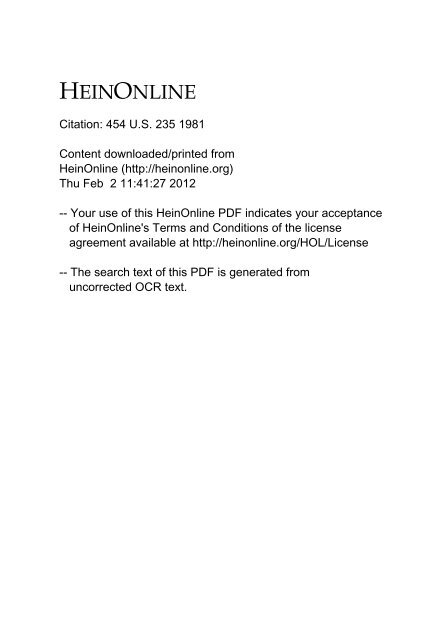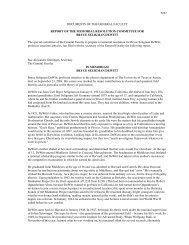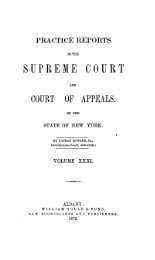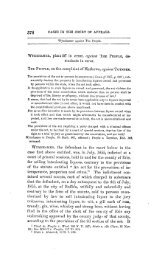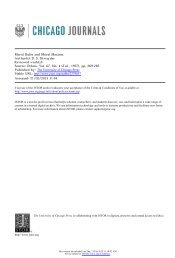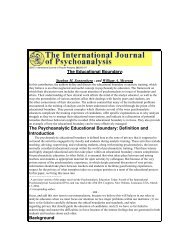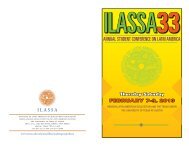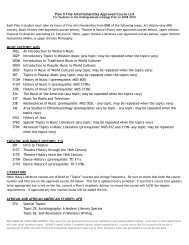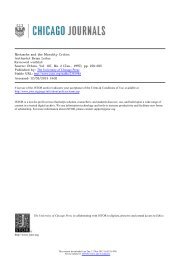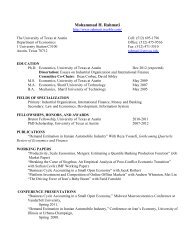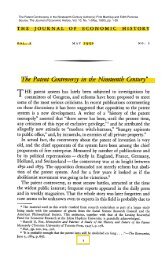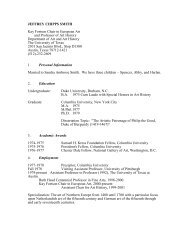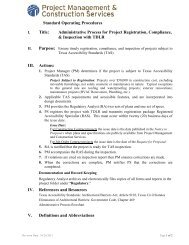Karayanni.FN023.Piper Aircraft v. Reyno.pdf - The University of ...
Karayanni.FN023.Piper Aircraft v. Reyno.pdf - The University of ...
Karayanni.FN023.Piper Aircraft v. Reyno.pdf - The University of ...
Create successful ePaper yourself
Turn your PDF publications into a flip-book with our unique Google optimized e-Paper software.
Citation: 454 U.S. 235 1981Content downloaded/printed fromHeinOnline (http://heinonline.org)Thu Feb 2 11:41:27 2012-- Your use <strong>of</strong> this HeinOnline PDF indicates your acceptance<strong>of</strong> HeinOnline's Terms and Conditions <strong>of</strong> the licenseagreement available at http://heinonline.org/HOL/License-- <strong>The</strong> search text <strong>of</strong> this PDF is generated fromuncorrected OCR text.
PIPER AIRCRAFT CO. v. REYNOSyllabusPIPER AIRCRAFT CO. v. REYNO, PERSONAL REP-RESENTATIVE OF THE ESTATES OFFEHILLY ET AL.CERTIORARI TO THE UNITED STATES COURT OF APPEALS FORTHE THIRD CIRCUITNo. 80-848. Argued October 14, 1981-Decided December 8, 1981*Respondent, as representative <strong>of</strong> the estates <strong>of</strong> several citizens and residents<strong>of</strong> Scotland who were killed in an airplane crash in Scotland duringa charter flight, instituted wrongful-death litigation in a California statecourt against petitioners, which are the company that manufactured theplane in Pennsylvania and the company that manufactured the plane'spropellers in Ohio. At the time <strong>of</strong> the crash the plane was registered inGreat Britain and was owned and operated by companies organized inthe United Kingdom. <strong>The</strong> pilot and all <strong>of</strong> the decedents' heirs and next<strong>of</strong> kin were Scottish subjects and citizens, and the investigation <strong>of</strong> theaccident was conducted by British authorities. Respondent sought torecover from petitioners on the basis <strong>of</strong> negligence or strict liability (notrecognized by Scottish law), and admitted that the action was filed in theUnited States because its laws regarding liability, capacity to sue, anddamages are more favorable to respondent's position than those <strong>of</strong> Scotland.On petitioners' motion, the action was removed to a Federal DistrictCourt in California and was then transferred to the United StatesDistrict Court for the Middle District <strong>of</strong> Pennsylvania, pursuant to 28U. S. C. § 1404(a). <strong>The</strong> District Court granted petitioners' motion todismiss the action on the ground <strong>of</strong> forum non conveniens. Relying onthe test set forth in Gulf Oil Corp. v. Gilbert, 330 U. S. 501, and analyzingthe "private interest factors" affecting the litigants' convenience andthe "public interest factors" affecting the forum's convenience, as setforth in Gilbert, the District Court concluded that Scotland was the appropriateforum. However, the Court <strong>of</strong> Appeals reversed, holding thatthe District Court had abused its discretion in conducting the Gilbertanalysis and that, in any event, dismissal is automatically barred where*Together with No. 80-883, Hartzell Propeller, Inc. v. <strong>Reyno</strong>, PersonalRepresentative <strong>of</strong> the Estates <strong>of</strong> Fehilly et al., also on certiorari to thesame court.
OCTOBER TERM, 1981Syllabus 454 U. S.the law <strong>of</strong> the alternative forum is less favorable to the plaintiff than thelaw <strong>of</strong> the forum chosen by the plaintiff.Held:1. Plaintiffs may not defeat a motion to dismiss on the ground <strong>of</strong>forum non conveniens merely by showing that the substantive law thatwould be applied in the alternative forum is less favorable to the plaintiffsthan that <strong>of</strong> the chosen forum. <strong>The</strong> possibility <strong>of</strong> a change in substantivelaw should ordinarily not be given conclusive or even substantialweight in the forum non conveniens inquiry. Canada Malting Co. v.Paterson Steamships, Ltd., 285 U. S. 413. Pp. 247-255.(a) Under Gilbert, supra, dismissal will ordinarily be appropriatewhere trial in the plaintiff's chosen forum imposes a heavy burden on thedefendant or the court, and where the plaintiff is unable to <strong>of</strong>fer any specificreasons <strong>of</strong> convenience supporting his choice. If substantial weightwere given to the possibility <strong>of</strong> an unfavorable change in law, however,dismissal might be barred even where trial in the chosen forum wasplainly inconvenient, and the forum non conveniens doctrine would becomevirtually useless. Such an approach not only would be inconsistentwith the purpose <strong>of</strong> the forum non conveniens doctrine, but alsowould pose substantial practical problems, requiring that trial courts determinecomplex problems in conflict <strong>of</strong> laws and comparative law, andincreasing the flow into American courts <strong>of</strong> litigation by foreign plaintiffsagainst American manufacturers. Pp. 248-252.(b) Nor may an analogy be drawn between forum non conveniensdismissals and transfers between federal courts pursuant to 28 U. S. C.§ 1404(a), which was construed in Van Dusen v. Barrack, 376 U. S. 612,as precluding a transfer if it resulted in a change in the applicable law.<strong>The</strong> statute was enacted to permit change <strong>of</strong> venue between federalcourts, and although it was drafted in accordance with the doctrine <strong>of</strong>forum non conveniens, it was intended to be a revision rather than acodification <strong>of</strong> the common law. District courts were given more discretionto transfer under § 1404(a) than they had to dismiss on grounds <strong>of</strong>forum non conveniens. Van Dusen v. Barrack, supra, distinguished.Pp. 253-254.2. <strong>The</strong> District Court properly decided that the presumption in favor<strong>of</strong> the plaintiff's forum choice applied with less than maximum forcewhen the plaintiff or (as here) the real parties in interest are foreign.When the plaintiff has chosen the home forum, it is reasonable to assumethat the choice is convenient; but when the plaintiff or real parties in interestare foreign, this assumption is much less reasonable and the plaintiff'schoice deserves less deference. Pp. 255-256.
PIPER AIRCRAFT CO. v. REYNO235 Syllabus3. <strong>The</strong> forum non conveniens determination is committed to the trialcourt's sound discretion and may be reversed only when there has been aclear abuse <strong>of</strong> discretion. Here, the District Court did not abuse its discretionin weighing the private and public interests under the Gilbertanalysis and thereby determining that the trial should be held in Scotland.Pp. 257-261.(a) In analyzing the private interest factors, the District Court didnot act unreasonably in concluding that fewer evidentiary problemswould be posed if the trial were held in Scotland, a large proportion <strong>of</strong>the relevant evidence being located there. <strong>The</strong> District Court also correctlyconcluded that the problems posed by the petitioners' inability toimplead potential Scottish third-party defendants-the pilot's estate, theplane's owners, and the charter company-supported holding the trial inScotland. Pp. 257-259.(b) <strong>The</strong> District Court's review <strong>of</strong> the factors relating to the publicinterest was also reasonable. Even aside from the question whetherScottish law might be applicable in part, all other public interest factorsfavor trial in Scotland, which has a very strong interest in this litigation.<strong>The</strong> accident occurred there, all <strong>of</strong> the decedents were Scottish, andapart from petitioners, all potential parties are either Scottish or English.As to respondent's argument that American citizens have an interestin ensuring that American manufacturers are deterred from producingdefective products and that additional deterrence might be obtainedby trial in the United States where they could be sued on the basis <strong>of</strong>both negligence and strict liability, any incremental deterrence from trialin an American court is likely to be insignificant and is not sufficient tojustify the enormous commitment <strong>of</strong> judicial time and resources thatwould be required. Pp. 259-261.630 F. 2d 149, reversed.MARSHALL, J., delivered the opinion <strong>of</strong> the Court, in which BURGER,C. J., and BLACKMUN and REHNQUIST, JJ., joined, and in Parts I and II <strong>of</strong>which WHITE, J., joined. WHITE J., filed an opinion concurring in partand dissenting in part, post, p. 261. STEVENS, J., filed a dissenting opinion,in which BRENNAN, J., joined, post, p. 261. POWELL, J., took no partin the decision <strong>of</strong> the cases. O'CONNOR, J., took no part in the considerationor decision <strong>of</strong> the cases.James M. Fitzsimons argued the cause for petitioner inNo. 80-848. With him on the brief were Charles J.McKelvey, Ann S. Pepperman, and Keith A. Jones.Warner W. Gardner argued the cause for petitioner in
OCTOBER TERM, 1981Opinion <strong>of</strong> the Court 454 U. S.No. 80-883. With him on the briefs were Nancy J. Bregsteinand Ronald C. Scott.Daniel C. Cathcart argued the cause and filed a brief forrespondent in both cases.,JUSTICE MARSHALL delivered the opinion <strong>of</strong> the Court.<strong>The</strong>se cases arise out <strong>of</strong> an air crash that took place in Scotland.Respondent, acting as representative <strong>of</strong> the estates <strong>of</strong>several Scottish citizens killed in the accident, broughtwrongful-death actions against petitioners that were ultimatelytransferred to the United States District Court forthe Middle District <strong>of</strong> Pennsylvania. Petitioners moved todismiss on the ground <strong>of</strong> forum non conveniens. After notingthat an alternative forum existed in Scotland, the DistrictCourt granted their motions. 479 F. Supp. 727 (1979). <strong>The</strong>United States Court <strong>of</strong> Appeals for the Third Circuit reversed.630 F. 2d 149 (1980). <strong>The</strong> Court <strong>of</strong> Appeals basedits decision, at least in part, on the ground that dismissal isautomatically barred where the law <strong>of</strong> the alternative forumis less favorable to the plaintiff than the law <strong>of</strong> the forum chosenby the plaintiff. Because we conclude that the possibility<strong>of</strong> an unfavorable change in law should not, by itself, bardismissal, and because we conclude that the District Courtdid not otherwise abuse its discretion, we reverse.IAIn July 1976, a small commercial aircraft crashed in theScottish highlands during the course <strong>of</strong> a charter flight fromtJohn D. Dillow, Samuel F. Pearce, John J. Hennelly, Jr., and ThomasC. Walsh filed a brief for Boeing Co. et al. as amnici curiae urging reversal.Thomas G. Smith filed a brief for the Law Offices <strong>of</strong> Gerald C. Stearnsas amicus curiae urging affirmance.
PIPER AIRCRAFT CO. v. REYNO235 Opinion <strong>of</strong> the CourtBlackpool to Perth. <strong>The</strong> pilot and five passengers werekilled instantly. <strong>The</strong> decedents were all Scottish subjectsand residents, as are their heirs and next <strong>of</strong> kin. <strong>The</strong>re wereno eyewitnesses to the accident. At the time <strong>of</strong> the crashthe plane was subject to Scottish air traffic control.<strong>The</strong> aircraft, a twin-engine Piper Aztec, was manufacturedin Pennsylvania by petitioner Piper <strong>Aircraft</strong> Co. (Piper).<strong>The</strong> propellers were manufactured in Ohio by petitionerHartzell Propeller, Inc. (Hartzell). At the time <strong>of</strong> the crashthe aircraft was registered in Great Britain and was ownedand maintained by Air Navigation and Trading Co., Ltd. (AirNavigation). It was operated by McDonald Aviation, Ltd.(McDonald), a Scottish air taxi service. Both Air Navigationand McDonald were organized in the United Kingdom. <strong>The</strong>wreckage <strong>of</strong> the plane is now in a hangar in Farnsborough,England.<strong>The</strong> British Department <strong>of</strong> Trade investigated the accidentshortly after it occurred. A preliminary report found thatthe plane crashed after developing a spin, and suggested thatmechanical failure in the plane or the propeller was responsible.At Hartzell's request, this report was reviewed by athree-member Review Board, which held a 9-day adversaryhearing attended by all interested parties. <strong>The</strong> ReviewBoard found no evidence <strong>of</strong> defective equipment and indicatedthat pilot error may have contributed to the accident.<strong>The</strong> pilot, who had obtained his commercial pilot's licenseonly three months earlier, was flying over high ground at analtitude considerably lower than the minimum height requiredby his company's operations manual.In July 1977, a California probate court appointed respondentGaynell <strong>Reyno</strong> administratrix <strong>of</strong> the estates <strong>of</strong> the fivepassengers. <strong>Reyno</strong> is not related to and does not know any<strong>of</strong> the decedents or their survivors; she was a legal secretaryto the attorney who filed this lawsuit. Several days afterher appointment, <strong>Reyno</strong> commenced separate wrongful-
OCTOBER TERM, 1981Opinion <strong>of</strong> the Court 454 U. S.death actions against Piper and Hartzell in the SuperiorCourt <strong>of</strong> California, claiming negligence and strict liability.'Air Navigation, McDonald, and the estate <strong>of</strong> the pilot are notparties to this litigation. <strong>The</strong> survivors <strong>of</strong> the five passengerswhose estates are represented by <strong>Reyno</strong> filed a separateaction in the United Kingdom against Air Navigation, Mc-Donald, and the pilot's estate.' <strong>Reyno</strong> candidly admits thatthe action against Piper and Hartzell was filed in the UnitedStates because its laws regarding liability, capacity to sue,and damages are more favorable to her position than arethose <strong>of</strong> Scotland. Scottish law does not recognize strict liabilityin tort. Moreover, it permits wrongful-death actionsonly when brought by a decedent's relatives. <strong>The</strong> relativesmay sue only for "loss <strong>of</strong> support and society." 3On petitioners' motion, the suit was removed to the UnitedStates District Court for the Central District <strong>of</strong> California.Piper then moved for transfer to the United States DistrictCourt for the Middle District <strong>of</strong> Pennsylvania, pursuant to 28U. S. C. § 1404(a). 4 Hartzell moved to dismiss for lack <strong>of</strong>personal jurisdiction, or in the alternative, to transfer. InDecember 1977, the District Court quashed service on'Avco-Lycoming, Inc., the manufacturer <strong>of</strong> the plane's engines, was alsonamed as a defendant. It was subsequently dismissed from the suit bystipulation.<strong>The</strong> pilot's estate has also filed suit in the United Kingdom against AirNavigation, McDonald, Piper, and Hartzell.'See Affidavit <strong>of</strong> Donald Ian Kerr MacLeod, App. A19 (affidavit submittedto District Court by petitioners describing Scottish law). Suits fordamages are governed by <strong>The</strong> Damages (Scotland) Act 1976.Section 1404(a) provides: "For the convenience <strong>of</strong> parties and witnesses,in the interest <strong>of</strong> justice, a district court may transfer any civil action toany other district or division where it might have been brought."'<strong>The</strong> District Court concluded that it could not assert personal jurisdictionover Hartzell consistent with due process. However, it decided not todismiss Hartzell because the corporation would be amenable to process inPennsylvania.
PIPER AIRCRAFT CO. v. REYNO235 Opinion <strong>of</strong> the CourtHartzell and transferred the case to the Middle District <strong>of</strong>Pennsylvania. Respondent then properly served process onHartzell.BIn May 1978, after the suit had been transferred, bothHartzell and Piper moved to dismiss the action on the ground<strong>of</strong> forum non conveniens. <strong>The</strong> District Court granted thesemotions in October 1979. It relied on the balancing test setforth by this Court in Gulf Oil Corp. v. Gilbert, 330 U. S. 501(1947), and its companion case, Koster v. Lumbermens Mut.Cas. Co., 330 U. S. 518 (1947). In those decisions, the Courtstated that a plaintiffs choice <strong>of</strong> forum should rarely be disturbed.However, when an alternative forum has jurisdictionto hear the case, and when trial in the chosen forumwould "establish ... oppressiveness and vexation to a defendant... out <strong>of</strong> all proportion to plaintiffs convenience,"or when the "chosen forum [is] inappropriate because <strong>of</strong> considerationsaffecting the court's own administrative and legalproblems," the court may, in the exercise <strong>of</strong> its sound discretion,dismiss the case. Koster, supra, at 524. To guide trialcourt discretion, the Court provided a list <strong>of</strong> "private interestfactors" affecting the convenience <strong>of</strong> the litigants, and a list <strong>of</strong>"public interest factors" affecting the convenience <strong>of</strong> the forum.Gilbert, supra, at 508-509.11"<strong>The</strong> factors pertaining to the private interests <strong>of</strong> the litigants includedthe "relative ease <strong>of</strong> access to sources <strong>of</strong> pro<strong>of</strong>; availability <strong>of</strong> compulsoryprocess for attendance <strong>of</strong> unwilling, and the cost <strong>of</strong> obtaining attendance <strong>of</strong>willing, witnesses; possibility <strong>of</strong> view <strong>of</strong> premises, if view would be appropriateto the action; and all other practical problems that make trial <strong>of</strong> acase easy, expeditious and inexpensive." Gilbert,, 330 U. S., at 508. <strong>The</strong>public factors bearing on the question included the administrative difficultiesflowing from court congestion; the "local interest in having localizedcontroversies decided at home"; the interest in having the trial <strong>of</strong> a diversitycase in a forum that is at home with the law that must govern the action;the avoidance <strong>of</strong> unnecessary problems in conflict <strong>of</strong> laws, or in theapplication <strong>of</strong> foreign law; and the unfairness <strong>of</strong> burdening citizens in anunrelated forum with jury duty. Id., at 509.
OCTOBER TERM, 1981Opinion <strong>of</strong> the Court 454 U. S.After describing our decisions in Gilbert and Koster, theDistrict Court analyzed the facts <strong>of</strong> these cases. It began byobserving that an alternative forum existed in Scotland;Piper and Hartzell had agreed to submit to the jurisdiction <strong>of</strong>the Scottish courts and to waive any statute <strong>of</strong> limitations defensethat might be available. It then stated that plaintiffschoice <strong>of</strong> forum was entitled to little weight. <strong>The</strong> court recognizedthat a plaintiffs choice ordinarily deserves substantialdeference. It noted, however, that <strong>Reyno</strong> "is a representative<strong>of</strong> foreign citizens and residents seeking a forum inthe United States because <strong>of</strong> the more liberal rules concerningproducts liability law," and that "the courts have beenless solicitous when the plaintiff is not an American citizen orresident, and particularly when the foreign citizens seek tobenefit from the more liberal tort rules provided for the protection<strong>of</strong> citizens and residents <strong>of</strong> the United States." 479F. Supp., at 731.<strong>The</strong> District Court next examined several factors relatingto the private interests <strong>of</strong> the litigants, and determined thatthese factors strongly pointed towards Scotland as the appropriateforum. Although evidence concerning the design,manufacture, and testing <strong>of</strong> the plane and propeller is locatedin the United States, the connections with Scotland areotherwise "overwhelming." Id., at 732. <strong>The</strong> real parties ininterest are citizens <strong>of</strong> Scotland, as were all the decedents.Witnesses who could testify regarding the maintenance <strong>of</strong> theaircraft, the training <strong>of</strong> the pilot, and the investigation <strong>of</strong> theaccident-all essential to the defense-are in Great Britain.Moreover, all witnesses to damages are located in Scotland.Trial would be aided by familiarity with Scottish topography,and by easy access to the wreckage.<strong>The</strong> District Court reasoned that because crucial witnessesand evidence were beyond the reach <strong>of</strong> compulsory process,and because the defendants would not be able to implead potentialScottish third-party defendants, it would be "unfair tomake Piper and Hartzell proceed to trial in this forum." Id.,
PIPER AIRCRAFT CO. v. REYNO235 Opinion <strong>of</strong> the Courtat 733. <strong>The</strong> survivors had brought separate actions in Scotlandagainst the pilot, McDonald, and Air Navigation. "[I]twould be fairer to all parties and less costly if the entire casewas presented to one jury with available testimony from allrelevant witnesses." Ibid. Although the court recognizedthat if trial were held in the United States, Piper andHartzell could file indemnity or contribution actions againstthe Scottish defendants, it believed that there was a significantrisk <strong>of</strong> inconsistent verdicts. 7<strong>The</strong> District Court concluded that the relevant public interestsalso pointed strongly towards dismissal. <strong>The</strong> court determinedthat Pennsylvania law would apply to Piper andScottish law to Hartzell if the case were tried in the MiddleDistrict <strong>of</strong> Pennsylvania. 8 As a result, "trial in this forumwould be hopelessly complex and confusing for a jury." Id.,at 734. In addition, the court noted that it was unfamiliarwith Scottish law and thus would have to rely upon expertsfrom that country. <strong>The</strong> court also found that the trial wouldbe enormously costly and time-consuming; that it would beunfair to burden citizens with jury duty when the Middle Dis-'<strong>The</strong> District Court explained that inconsistent verdicts might result ifpetitioners were held liable on the basis <strong>of</strong> strict liability here, and thenrequired to prove negligence in an indemnity action in Scotland. Moreover,even if the same standard <strong>of</strong> liability applied, there was a danger thatdifferent juries would find different facts and produce inconsistent results.'Under Klaxon v. Stentor Electric Mfg. Co., 313 U. S. 487 (1941), acourt ordinarily must apply the choice-<strong>of</strong>-law rules <strong>of</strong> the State in which itsits. However, where a case is transferred pursuant to 28 U. S. C.§ 1404(a), it must apply the choice-<strong>of</strong>-law rules <strong>of</strong> the State from which thecase was transferred. Van Dusen v. Barrack, 376 U. S. 612 (1946). Relyingon these two cases, the District Court concluded that Californiachoice-<strong>of</strong>-law rules would apply to Piper, and Pennsylvania choice-<strong>of</strong>-lawrules would apply to Hartzell. It further concluded that California applieda "governmental interests" analysis in resolving choice-<strong>of</strong>-law problems,and that Pennsylvania employed a "significant contacts" analysis. <strong>The</strong>court used the "governmental interests" analysis to determine that Pennsylvanialiability rules would apply to Piper, and the "significant contacts"analysis to determine that Scottish liability rules would apply to Hartzell.
OCTOBER TERM, 1981Opinion <strong>of</strong> the Court 454 U. S.trict <strong>of</strong> Pennsylvania has little connection with the controversy;and that Scotland has a substantial interest in the outcome<strong>of</strong> the litigation.In opposing the motions to dismiss, respondent contendedthat dismissal would be unfair because Scottish law was lessfavorable. <strong>The</strong> District Court explicitly rejected this claim.It reasoned that the possibility that dismissal might lead toan unfavorable change in the law did not deserve significantweight; any deficiency in the foreign law was a "matter to bedealt with in the foreign forum." Id., at 738.COn appeal, the United States Court <strong>of</strong> Appeals for theThird Circuit reversed and remanded for trial. <strong>The</strong> decisionto reverse appears to be based on two alternative grounds.First, the Court held that the District Court abused its discretionin conducting the Gilbert analysis. Second, theCourt held that dismissal is never appropriate where the law<strong>of</strong> the alternative forum is less favorable to the plaintiff.<strong>The</strong> Court <strong>of</strong> Appeals began its review <strong>of</strong> the DistrictCourt's Gilbert analysis by noting that the plaintiffs choice <strong>of</strong>forum deserved substantial weight, even though the real partiesin interest are nonresidents. It then rejected the DistrictCourt's balancing <strong>of</strong> the private interests. It found thatPiper and Hartzell had failed adequately to support theirclaim that key witnesses would be unavailable if trial wereheld in the United States: they had never specified the witnessesthey would call and the testimony these witnesseswould provide. <strong>The</strong> Court <strong>of</strong> Appeals gave little weight tothe fact that Piper and Hartzell would not be able to impleadpotential Scottish third-party defendants, reasoning that thisdifficulty would be "burdensome" but not "unfair," 630 F. 2d,at 162.1 Finally, the court stated that resolution <strong>of</strong> the suit'<strong>The</strong> court claimed that the risk <strong>of</strong> inconsistent verdicts was slight becausePennsylvania and Scotland both adhere to principles <strong>of</strong> res judicata.
PIPER AIRCRAFT CO. v. REYNO235 Opinion <strong>of</strong> the Courtwould not be significantly aided by familiarity with Scottishtopography, or by viewing the wreckage.<strong>The</strong> Court <strong>of</strong> Appeals also rejected the District Court'sanalysis <strong>of</strong> the public interest factors. It found that the DistrictCourt gave undue emphasis to the application <strong>of</strong> Scottishlaw: "'the mere fact that the court is called upon to determineand apply foreign law does not present a legal problem<strong>of</strong> the sort which would justify the dismissal <strong>of</strong> a case otherwiseproperly before the court."' Id., at 163 (quoting H<strong>of</strong>fmanv. Goberman, 420 F. 2d 423, 427 (CA3 1970)). In anyevent, it believed that Scottish law need not be applied.After conducting its own choice-<strong>of</strong>-law analysis, the Court <strong>of</strong>Appeals determined that American law would govern the actionsagainst both Piper and Hartzell.1 0 <strong>The</strong> same choice-<strong>of</strong>lawanalysis apparently led it to conclude that Pennsylvaniaand Ohio, rather than Scotland, are the jurisdictions with thegreatest policy interests in the dispute, and that all otherpublic interest factors favored trial in the United States."'"<strong>The</strong> Court <strong>of</strong> Appeals agreed with the District Court that Californiachoice-<strong>of</strong>-law rules applied to Piper, and that Pennsylvania choice-<strong>of</strong>-lawrules applied to Hartzell, see n. 8, supra. It did not agree, however, thatCalifornia used a "governmental interests" analysis and that Pennsylvaniaused a "significant contacts" analysis. Rather, it believed that both jurisdictionsemployed the "false conflicts" test. Applying this test, it concludedthat Ohio and Pennsylvania had a greater policy interest in the disputethan Scotland, and that American law would apply to both Piper andHartzell." <strong>The</strong> court's reasoning on this point is somewhat unclear. It states:"We have held that under the applicable choice <strong>of</strong> law rules Pennsylvaniaand Ohio are the jurisdictions with the greatest policy interest in this dispute.It follows that the other public interest factors that should be consideredunder the Supreme Court cases <strong>of</strong> Gilbert and Koster favor trial inthis country rather than Scotland." 630 F. 2d, at 171.<strong>The</strong> Court <strong>of</strong> Appeals concluded as part <strong>of</strong> its choice-<strong>of</strong>-law analysis thatthe United States had the greatest policy interest in the dispute. Seen. 10, supra. It apparently believed that this conclusion necessarily impliedthat the forum non conveniens public interest factors pointed towardtrial in the United States.
OCTOBER TERM, 1981Opinion <strong>of</strong> the Court 454 U. S.In any event, it appears that the Court <strong>of</strong> Appeals wouldhave reversed even if the District Court had properly balancedthe public and private interests. <strong>The</strong> court stated:"[I]t is apparent that the dismissal would work a changein the applicable law so that the plaintiff's strict liabilityclaim would be eliminated from the case. But ... a dismissalfor forum non conveniens, like a statutory transfer,'should not, despite its convenience, result in achange in the applicable law.' Only when American lawis not applicable, or when the foreign jurisdiction would,as a matter <strong>of</strong> its own choice <strong>of</strong> law, give the plaintiff thebenefit <strong>of</strong> the claim to which she is entitled here, woulddismissal be justified." 630 F. 2d, at 163-164 (footnoteomitted) (quoting DeMateos v. Texaco, Inc., 562 F. 2d895, 899 (CA3 1977), cert. denied, 435 U. S. 904 (1978)).In other words, the court decided that dismissal is automaticallybarred if it would lead to a change in the applicable lawunfavorable to the plaintiff.We granted certiorari in these cases to consider the questionsthey raise concerning the proper application <strong>of</strong> the doctrine<strong>of</strong> forum non conveniens. 450 U. S. 909 (1981).12'"We granted certiorari in No.80-848 to consider the question"[w]hether, in an action in federal district court brought by foreign plaintiffsagainst American defendants, the plaintiffs may defeat a motion to dismisson the ground <strong>of</strong> forum non conveniens merely by showing that thesubstantive law that would be applied if the case were litigated in the districtcourt is more favorable to them than the law that would be applied bythe courts <strong>of</strong> their own nation." We granted certiorari in No. 80-883 toconsider the question whether "a motion to dismiss on grounds <strong>of</strong> forumnon conveniens [should] be denied whenever the law <strong>of</strong> the alternate forumis less favorable to recovery than that which would be applied by the districtcourt."In this opinion, we begin by considering whether the Court <strong>of</strong> Appealsproperly held that the possibility <strong>of</strong> an unfavorable change in law automaticallybars dismissal. Part II, infra. Since we conclude that the Court <strong>of</strong>Appeals erred, we then consider its review <strong>of</strong> the District Court's Gilbertanalysis to determine whether dismissal was otherwise appropriate. Part
PIPER AIRCRAFT CO. v. REYNO235 Opinion <strong>of</strong> the CourtII<strong>The</strong> Court <strong>of</strong> Appeals erred in holding that plaintiffs maydefeat a motion to dismiss on the ground <strong>of</strong> forum nonconveniens merely by showing that the substantive law thatwould be applied in the alternative forum is less favorable tothe plaintiffs than that <strong>of</strong> the present forum. <strong>The</strong> possibility<strong>of</strong> a change in substantive law should ordinarily not be givenconclusive or even substantial weight in the forum nonconveniens inquiry.We expressly rejected the position adopted by the Court <strong>of</strong>Appeals in our decision in Canada Malting Co. v. PatersonSteamships, Ltd., 285 U. S. 413 (1932). That case arose out<strong>of</strong> a collision between two vessels in American waters. <strong>The</strong>Canadian owners <strong>of</strong> cargo lost in the accident sued the Canadianowners <strong>of</strong> one <strong>of</strong> the vessels in Federal District Court.<strong>The</strong> cargo owners chose an American court in large part becausethe relevant American liability rules were more favorablethan the Canadian rules. <strong>The</strong> District Court dismissedon grounds <strong>of</strong> forum non conveniens. <strong>The</strong> plaintiffs arguedthat dismissal was inappropriate because Canadian laws wereless favorable to them. This Court nonetheless affirmed:"We have no occasion to enquire by what law the rights<strong>of</strong> the parties are governed, as we are <strong>of</strong> the opinionIII, infra. We believe that it is necessary to discuss the Gilbert analysisin order to properly dispose <strong>of</strong> the cases.<strong>The</strong> questions on which certiorari was granted are sufficiently broad tojustify our discussion <strong>of</strong> the District Court's Gilbert analysis. However,even if the issues we discuss in Part III are not within the bounds <strong>of</strong> thequestions with respect to which certiorari was granted, our consideration<strong>of</strong> these issues is not inappropriate. An order limiting the grant <strong>of</strong> certioraridoes not operate as a jurisdictional bar. We may consider questionsoutside the scope <strong>of</strong> the limited order when resolution <strong>of</strong> those questions isnecessary for the proper disposition <strong>of</strong> the case. See Olmstead v. UnitedStates, 277 U. S. 438 (1928); McCandless v. Furlaud, 293 U. S. 67 (1934);Redrup v. New York, 386 U. S. 767 (1967).
OCTOBER TERM, 1981Opinion <strong>of</strong> the Court 454 U. S.that, under any view <strong>of</strong> that question, it lay within thediscretion <strong>of</strong> the District Court to decline to assume jurisdictionover the controversy. . . . '[T]he court willnot take cognizance <strong>of</strong> the case if justice would be as welldone by remitting the parties to their home forum."'Id., at 419-420 (quoting Charter Shipping Co. v.Bowring, Jones & Tidy, Ltd., 281 U. S. 515, 517 (1930).<strong>The</strong> Court further stated that "[t]here was no basis for thecontention that the District Court abused its discretion."285 U.S., at 423.It is true that Canada Malling was decided before Gilbert,and that the doctrine <strong>of</strong> fbrnmn non con veniens was not fullycrystallized until our decision in that case. However, Gilbertin no way affects the validity <strong>of</strong> Canada Malting. In-"<strong>The</strong> doctrine <strong>of</strong> tor6rn ?oi con ceaiens has a long history. It originatedin Scotland, see Braucher. <strong>The</strong> Inconvenient Federal Forum, 60Harv. L. Rev. 908, 909-911 (1947), and became part <strong>of</strong> the common law <strong>of</strong>many States, see id., at 911-912: Blair, <strong>The</strong> Doctrine <strong>of</strong> Forum NonConveniens in Anglo-American Law, 29 Cohum. L. Rev. 1 (1929). <strong>The</strong>doctrine was also frequently applied in federal admiralty actions. See,e. g., Canada Maltig Co. v. Paoterson Steamship.s. Ltd.: see also Bickel,<strong>The</strong> Doctrine <strong>of</strong> Forum Non Conveniens As Applied in the Federal Courtsin Matters <strong>of</strong> Admiralty, 35 Cornell L. Q. 12 (1949). In WilliUMs v. GreenBay! & Western R. Co., 326 U. S. 549 (1946), the Court first indicated thatmotions to dismiss on grounds <strong>of</strong>.fiwmn non coc reniens could be made infederal diversity actions. <strong>The</strong> doctrine became firmly established whenGilbert and Koster were decided one year later.In previous ftorn non coit,enies decisions, the Court has left unresolvedthe question whether under Erie R. Co. v. Tompkins, 304 U. S. 64(1938), state or federal law <strong>of</strong>firom n)on' co eoiens applies in a diversitycase. Gilbert, 330 U. S., at 509; Koster, :330 U. S., at 529; Williams v.Green Bay & Western R. Co., sipra, at 551, 558-559. <strong>The</strong> Court did notdecide this issue because the same result would have been reached in eachcase under federal or state law. <strong>The</strong> lower courts in these cases reachedthe same conclusion: Pennsylvania and California law on .*bronn noncon veniens dismissals are virtually identical to federal law. See 630 F. 2d,at 158. Thus, here also, we need not resolve the Erie question.
PIPER AIRCRAFT CO. v. REYNO235 Opinion <strong>of</strong> the Courtdeed, by holding that the central focus <strong>of</strong> the .forum nonconveniens inquiry is convenience, Gilbert implicitly recognizedthat dismissal may not be barred solely because <strong>of</strong> thepossibility <strong>of</strong> an unfavorable change in law." Under Gilbert,dismissal will ordinarily be appropriate where trial in theplaintiff's chosen forum imposes a heavy burden on the defendantor the court, and where the plaintiff is unable to <strong>of</strong>ferany specific reasons <strong>of</strong> convenience supporting his choice. ' 5If substantial weight were given to the possibility <strong>of</strong> an unfavorablechange in law, however, dismissal might be barredeven where trial in the chosen forum was plainlyinconvenient.<strong>The</strong> Court <strong>of</strong> Appeals' decision is inconsistent with thisCourt's earlier./brum non conveniens decisions in another respect.Those decisions have repeatedly emphasized theneed to retain flexibility. In Gilbert, the Court refused toidentify specific circumstances "which will justify or requireeither grant or denial <strong>of</strong> remedy." 330 U. S., at 508. Similarly,in Koster, the Court rejected the contention that wherea trial would involve inquiry into the internal affairs <strong>of</strong> a foreigncorporation, dismissal was always appropriate. "Thatis one, but only one, factor which may show convenience."330 U. S., at 527. And in Williams v. Green Bay & WesternR. Co., 326 U. S. 549, 557 (1946), we stated that we wouldnot lay down a rigid rule to govern discretion, and that"[e]ach case turns on its facts." If central emphasis were1See also Williams v. Green Bay & Westerii R. Co., snpra, at 555, n. 4(citing with approval a Scottish case that dismissed an action on the ground<strong>of</strong>tftwn non con t,en jiens despite the possibility'<strong>of</strong> an unfavorable change inlaw).In other words, Gilbert held that dismissal may be warranted where aplaintiff chooses a particular forum, not because it is convenient, but solelyin order to harass the defendant or take advantage <strong>of</strong> favorable law. Thisis precisely the situation in which the Court <strong>of</strong> Appeals' rule would bardismissal.
OCTOBER TERM, 1981Opinion <strong>of</strong> the Court 454 U. S.placed on any one factor, the forum non conveniens doctrinewould lose much <strong>of</strong> the very flexibility that makes it sovaluable.In fact, if conclusive or substantial weight were given tothe possibility <strong>of</strong> a change in law, the forum non conveniensdoctrine would become virtually useless. Jurisdiction andvenue requirements are <strong>of</strong>ten easily satisfied. As a result,many plaintiffs are able to choose from among several forums.Ordinarily, these plaintiffs will select that forumwhose choice-<strong>of</strong>-law rules are most advantageous. Thus, ifthe possibility <strong>of</strong> an unfavorable change in substantive law isgiven substantial weight in the forum non conveniens inquiry,dismissal would rarely be proper.Except for the court below, every Federal Court <strong>of</strong> Appealsthat has considered this question after Gilbert has heldthat dismissal on grounds <strong>of</strong> forum non conveniens may begranted even though the law applicable in the alternativeforum is less favorable to the plaintiff's chance <strong>of</strong> recovery.See, e. g., Pain v. United Technologies Corp., 205 U. S.App. D. C. 229, 248-249, 637 F. 2d 775, 794-795 (1980); Fitzgeraldv. Texaco, Inc., 521 F. 2d 448, 453 (CA2 1975), cert.denied, 423 U. S. 1052 (1976); Anastasiadis v. S.S. LittleJohn, 346 F. 2d 281, 283 (CA5 1965), cert. denied, 384 U. S.920 (1966).16 Several courts have relied expressly on CanadaMalting to hold that the possibility <strong>of</strong> an unfavorablechange <strong>of</strong> law should not, by itself, bar dismissal. See Fitz-16 Cf. Dahl v. United Technologies Corp., 632 F. 2d 1027, 1032 (CA31980) (dismissal affirmed where "Norwegian substantive law will predominatethe trial <strong>of</strong> this case and the mere presence <strong>of</strong> a count pleaded underConnecticut law but which may have little chance <strong>of</strong> success does not warranta different conclusion"). But see DeMateos v. Texaco, Inc., 562 F. 2d895, 899 (CA3 1977) (dictum) (principle that § 1404(a) transfer should notresult in change in law is no less applicable to dismissal on grounds <strong>of</strong> forumnon conveniens), cert. denied, 435 U. S. 904 (1978). <strong>The</strong> court belowrelied on the dictum in DeMateos in reaching its decision. See infra, at253-254.
PIPER AIRCRAFT CO. v. REYNO235 Opinion <strong>of</strong> the Courtgerald v. Texaco, Inc., supra; Anglo-American Grain Co. v.<strong>The</strong> SIT Mina D'Amico, 169 F. Supp. 908 (ED Va. 1959).<strong>The</strong> Court <strong>of</strong> Appeals' approach is not only inconsistentwith the purpose <strong>of</strong> the forum non conveniens doctrine, butalso poses substantial practical problems. If the possibility<strong>of</strong> a change in law were given substantial weight, decidingmotions to dismiss on the ground <strong>of</strong> forum non convenienswould become quite difficult. Choice-<strong>of</strong>-law analysis wouldbecome extremely important, and the courts would frequentlybe required to interpret the law <strong>of</strong> foreign jurisdictions.First, the trial court would have to determine whatlaw would apply if the case were tried in the chosen forum,and what law would apply if the case were tried in the alternativeforum. It would then have to compare the rights,remedies, and procedures available under the law that wouldbe applied in each forum. Dismissal would be appropriateonly if the court concluded that the law applied by the alternativeforum is as favorable to the plaintiff as that <strong>of</strong> the chosenforum. <strong>The</strong> doctrine <strong>of</strong> forum non conveniens, however,is designed in part to help courts avoid conducting complexexercises in comparative law. As we stated in Gilbert, thepublic interest factors point towards dismissal where thecourt would be required to "untangle problems in conflict <strong>of</strong>laws, and in law foreign to itself." 330 U. S., at 509.Upholding the decision <strong>of</strong> the Court <strong>of</strong> Appeals would resultin other practical problems. At least where the foreignplaintiff named an American manufacturer as defendant, 7 acourt could not dismiss the case on grounds <strong>of</strong> forum non,1 In fact, the defendant might not even have to be American. A foreignplaintiff seeking damages for an accident that occurred abroad might beable to obtain service <strong>of</strong> process on a foreign defendant who does businessin the United States. Under the Court <strong>of</strong> Appeals' holding, dismissalwould be barred if the law in the alternative forum were less favorable tothe plaintiff-even though none <strong>of</strong> the parties are American, and eventhough there is absolutely no nexus between the subject matter <strong>of</strong> the litigationand the United States.
OCTOBER TERM, 1981Opinion <strong>of</strong> the Court 454 U. S.conveniens where dismissal might lead to an unfavorablechange in law. <strong>The</strong> American courts, which are already extremelyattractive to foreign plaintiffs, 18 would become evenmore attractive. <strong>The</strong> flow <strong>of</strong> litigation into the UnitedStates would increase and further congest already crowdedcourts. 1" First, all but 6 <strong>of</strong> the 50 American States-Delaware, Massachusetts,Michigan, North Carolina, Virginia, and Wyoming-<strong>of</strong>fer strict liability.1 CCH Prod. Liability Rep. § 4016 (1981). Rules roughly equivalent toAmerican strict liability are effective in France, Belgium, and Luxembourg.West Germany and Japan have a strict liability statute forpharmaceuticals. However, strict liability remains primarily an Americaninnovation. Second, the tort plaintiff may choose, at least potentially,from among 50 jurisdictions if he decides to file suit in the United States.Each <strong>of</strong> these jurisdictions applies its own set <strong>of</strong> malleable choice-<strong>of</strong>-lawrules. Third, jury trials are almost always available in the United States,while they are never provided in civil law jurisdictions. G. Gloss, ComparativeLaw 12 (1979); J. Merryman, <strong>The</strong> Civil Law Tradition 121 (1969).Even in the United Kingdom, most civil actions are not tried before a jury.1 G. Keeton, <strong>The</strong> United Kingdom: <strong>The</strong> Development <strong>of</strong> its Laws and Constitutions309 (1955). Fourth, unlike most foreign jurisdictions, Americancourts allow contingent attorney's fees, and do not tax losing parties withtheir opponents' attorney's fees. R. Schlesinger, Comparative Law:Cases, Text, Materials 275-277 (3d ed. 1970); Orban, Product Liability: AComparative Legal Restatement-Foreign National Law and the EEC Directive,8 Ga. J. Int'l & Comp. L. 342, 393 (1978). Fifth, discovery is moreextensive in American than in foreign courts. R. Schlesinger, supra, at307, 310, and n. 33."In holding that the possibility <strong>of</strong> a change in law unfavorable to theplaintiff should not be given substantial weight, we also necessarily holdthat the possibility <strong>of</strong> a change in law favorable to defendant should not beconsidered. Respondent suggests that Piper and Hartzell filed the motionto dismiss, not simply because trial in the United States would be inconvenient,but also because they believe the laws <strong>of</strong> Scotland are more favorable.She argues that this should be taken into account in the analysis <strong>of</strong>the private interests. We recognize, <strong>of</strong> course, that Piper and Hartzellmay be engaged in reverse forum-shopping. However, this possibility ordinarilyshould not enter into a trial court's analysis <strong>of</strong> the private interests.If the defendant is able to overcome the presumption in favor <strong>of</strong>plaintiff by showing that trial in the chosen forum would be unnecessarily
PIPER AIRCRAFT CO. v. REYNO235 Opinion <strong>of</strong> the Court<strong>The</strong> Court <strong>of</strong> Appeals based its decision, at least in part, onan analogy between dismissals on grounds <strong>of</strong> forum nonconveniens and transfers between federal courts pursuant to§ 1404(a). In Van Dusen v. Barrack, 376 U. S. 612 (1964),this Court ruled that a § 1404(a) transfer should not result ina change in the applicable law. Relying on dictum in an earlierThird Circuit opinion interpreting Van Dusen, the courtbelow held that that principle is also applicable to a dismissalon forum non conveniens grounds. 630 F. 2d, at 164, andn. 51 (citing DeMateos v. Texaco, Inc., 562 F. 2d, at 899).However, § 1404(a) transfers are different than dismissals onthe ground <strong>of</strong> forum non conveniens.Congress enacted § 1404(a) to permit change <strong>of</strong> venue betweenfederal courts. Although the statute was drafted inaccordance with the doctrine <strong>of</strong> forum non conveniens, seeRevisor's Note, H. R. Rep. No. 308, 80th Cong., 1st Sess.,A132 (1947); H. R. Rep. No. 2646, 79th Cong., 2d Sess., A127(1946), it was intended to be a revision rather than a codification<strong>of</strong> the common law. Norwood v. Kirkpatrick, 349 U. S.29 (1955). District courts were given more discretion totransfer under § 1404(a) than they had to dismiss on grounds<strong>of</strong> forum non conveniens. Id., at 31-32.<strong>The</strong> reasoning employed in Van Dusen v. Barrack is simplyinapplicable to dismissals on grounds <strong>of</strong> forum nonconveniens. That case did not discuss the common-law doctrine.Rather, it focused on "the construction and application"<strong>of</strong> § 1404(a). 376 U. S., at 613.2 o Emphasizing the reburdensome,dismissal is appropriate-regardless <strong>of</strong> the fact that defendantmay also be motivated by a desire to obtain a more favorable forum.Cf. Kloeckner Reederei und Kohlenhandel v. A/S Hakedal, 210 F. 2d 754,757 (CA2) (defendant not entitled to dismissal on grounds <strong>of</strong> forum nonconveniens solely because the law <strong>of</strong> the original forum is less favorable tohim than the law <strong>of</strong> the alternative forum), cert. dism'd by stipulation, 348U. S. 801 (1954).'Barrack at least implicitly recognized that the rule it announced fortransfer under § 1404(a) was not the common-law rule. It cited several de-
OCTOBER TERM, 1981Opinion <strong>of</strong> the Court 454 U. S.medial purpose <strong>of</strong> the statute, Barrack concluded that Congresscould not have intended a transfer to be accompaniedby a change in law. Id., at 622. <strong>The</strong> statute was designedas a "federal housekeeping measure," allowing easy change <strong>of</strong>venue within a unified federal system. Id., at 613. <strong>The</strong>Court feared that if a change in venue were accompanied by achange in law, forum-shopping parties would take unfair advantage<strong>of</strong> the relaxed standards for transfer. <strong>The</strong> rule wasnecessary to ensure the just and efficient operation <strong>of</strong> thestatute.21We do not hold that the possibility <strong>of</strong> an unfavorablechange in law should never be a relevant consideration in aforum non conveniens inquiry. Of course, if the remedyprovided by the alternative forum is so clearly inadequate orunsatisfactory that it is no remedy at all, the unfavorablechange in law may be given substantial weight; the districtcourt may conclude that dismissal would not be in the interests<strong>of</strong> justice.' In these cases, however, the remedies thatcisions under § 1404(a) in which lower courts had been "strongly inclined toprotect plaintiffs against the risk that transfer might be accompanied by aprejudicial change in applicable state laws." 376 U. S., at 630, n. 26.<strong>The</strong>se decisions frequently rested on the assumption that a change in lawwould have been unavoidable under common law forum non conveniens,but could be avoided under § 1404(a). See, e. g., Greve v. Gibraltar Enterprises,Inc., 85 F. Supp. 410, 414 (NM 1949).2 <strong>The</strong> United States Court <strong>of</strong> Appeals for the Second Circuit has expresslyrejected the contention that rules governing transfers pursuant to§ 1404(a) also govern forum non conveniens dismissals. Schertenleib v.Traum, 589 F. 2d 1156 (1978).'At the outset <strong>of</strong> any forum non conveniens inquiry, the court must determinewhether there exists an alternative forum. Ordinarily, this requirementwill be satisfied when the defendant is "amenable to process" inthe other jurisdiction. Gilbert, 330 U.S., at 506-507. In rare circumstances,however, where the remedy <strong>of</strong>fered by the other forum is clearlyunsatisfactory, the other forum may not be an adequate alternative, andthe initial requirement may not be satisfied. Thus, for example, dismissalwould not be appropriate where the alternative forum does not permit litigation<strong>of</strong> the subject matter <strong>of</strong> the dispute. Cf. Phoenix Canada Oil Co.
PIPER AIRCRAFT CO. v. REYNO235 Opinion <strong>of</strong> the Courtwould be provided by the Scottish courts do not fall withinthis category. Although the relatives <strong>of</strong> the decedents maynot be able to rely on a strict liability theory, and althoughtheir potential damages award may be smaller, there is nodanger that they will be deprived <strong>of</strong> any remedy or treatedunfairly.III<strong>The</strong> Court <strong>of</strong> Appeals also erred in rejecting the DistrictCourt's Gilbert analysis. <strong>The</strong> Court <strong>of</strong> Appeals stated thatmore weight should have been given to the plaintiff's choice<strong>of</strong> forum, and criticized the District Court's analysis <strong>of</strong> theprivate and public interests. However, the District Court'sdecision regarding the deference due plaintiff's choice <strong>of</strong>forum was appropriate. Furthermore, we do not believethat the District Court abused its discretion in weighing theprivate and public interests.A<strong>The</strong> District Court acknowledged that there is ordinarily astrong presumption in favor <strong>of</strong> the plaintiff's choice <strong>of</strong> forum,which may be overcome only when the private and public interestfactors clearly point towards trial in the alternativeforum. It held, however, that the presumption applies withless force when the plaintiff or real parties in interest areforeign.<strong>The</strong> District Court's distinction between resident or citizenplaintiffs and foreign plaintiffs is fully justified. In Koster,the Court indicated that a plaintiff's choice <strong>of</strong> forum is entitledto greater deference when the plaintiff has chosen thehome forum. 330 U. S., at 524.1 When the home forum hasLtd. v. Texaco, Inc., 78 F. R. D. 445 (Del. 1978) (court refuses to dismiss,where alternative forum is Ecuador, it is unclear whether Ecuadorean tribunalwill hear the case, and there is no generally codified Ecuadoreanlegal remedy for the unjust enrichment and tort claims asserted).I In Koster, we stated that "[i]n any balancing <strong>of</strong> conveniences, a realshowing <strong>of</strong> convenience by a plaintiff who has sued in his home forum will
OCTOBER TERM, 1981Opinion <strong>of</strong> the Court 454 U. S.been chosen, it is reasonable to assume that this choice is convenient.When the plaintiff is foreign, however, this assumptionis much less reasonable. Because the central purpose<strong>of</strong> any forum non conveniens inquiry is to ensure thatthe trial is convenient, a foreign plaintiff's choice deservesless deference. 2 Anormally outweigh the inconvenience the defendant may have shown."330 U. S., at 524. See also Swift & Co. Packers v. Compania Colombianadel Caribe, 339 U. S. 684, 697 (1950) ("suit by a United States citizenagainst a foreign respondent brings into force considerations very differentfrom those in suits between foreigners"); Canada Malting Co. v. PatersonSteamships, Ltd., 285 U. S., at 421 ("[t]he rule recognizing an unqualifieddiscretion to decline jurisdiction in suits in admiralty between foreignersappears to be supported by an unbroken line <strong>of</strong> decisions in the lower federalcourts").As the District Court correctly noted in its opinion, 479 F. Supp., at 731;see also n. 10, supra, the lower federal courts have routinely given lessweight to a foreign plaintiff's choice <strong>of</strong> forum. See, e. g., FoundingChurch <strong>of</strong> Scientology v. Verlag, 175 U. S. App. D. C. 402, 408, 536 F. 2d429, 435 (1976); Paper Operations Consultants Int'l, Ltd. v. SS Hong KongAmber, 513 F. 2d 667, 672 (CA9 1975); Fitzgerald v. Texaco, Inc., 521 F.2d 448, 451 (CA2 1975), cert. denied, 423 U. S. 1052 (1976); Mobil TankersCo. v. Mene Grande Oil Co., 363 F. 2d 611, 614 (CA3), cert. denied, 385U. S. 945 (1966); Ionescu v. E. F. Hutton & Co. (France), 465 F. Supp.139 (SDNY 1979); Michell v. General Motors Corp., 439 F. Supp. 24, 27(ND Ohio 1977).A citizen's forum choice should not be given dispositive weight, however.See Pain v. United Technologies Corp., 205 U. S. App. D. C. 229, 252-253, 637 F. 2d 775, 796-797 (1980); Mizokami Bros. <strong>of</strong> Arizona, Inc. v.Baychem Corp., 556 F. 2d 975 (CA9 1977), cert. denied, 434 U. S. 1035(1978). Citizens or residents deserve somewhat more deference than foreignplaintiffs, but dismissal should not be automatically barred when aplaintiff has filed suit in his home forum. As always, if the balance <strong>of</strong> conveniencessuggests that trial in the chosen forum would be unnecessarilyburdensome for the defendant or the court, dismissal is proper.I See Pain v. United Technologies Corp., supra, at 253, 637 F. 2d, at 797(citizenship and residence are proxies for convenience); see also Note,Forum Non Conveniens and American Plaintiffs in the Federal Courts, 47U. Chi. L. Rev. 373, 382-383 (1980).Respondent argues that since plaintiffs will ordinarily file suit in the ju-
PIPER AIRCRAFT CO. v. REYNO235 Opinion <strong>of</strong> the CourtB<strong>The</strong> forum non conveniens determination is committed tothe sound discretion <strong>of</strong> the trial court. It may be reversedonly when there has been a clear abuse <strong>of</strong> discretion; wherethe court has considered all relevant public and private interestfactors, and where its balancing <strong>of</strong> these factors is reasonable,its decision deserves substantial deference. Gilbert,330 U. S., at 511-512; Koster, 330 U. S., at 531. Here, theCourt <strong>of</strong> Appeals expressly acknowledged that the standard<strong>of</strong> review was one <strong>of</strong> abuse <strong>of</strong> discretion. In examining theDistrict Court's analysis <strong>of</strong> the public and private interests,however, the Court <strong>of</strong> Appeals seems to have lost sight <strong>of</strong>this rule, and substituted its own judgment for that <strong>of</strong> theDistrict Court.(1)In analyzing the private interest factors, the District Courtstated that the connections with Scotland are "overwhelming."479 F. Supp., at 732. This characterization may besomewhat exaggerated. Particularly with respect to thequestion <strong>of</strong> relative ease <strong>of</strong> access to sources <strong>of</strong> pro<strong>of</strong>, the privateinterests point in both directions. As respondent emphasizes,records concerning the design, manufacture, andtesting <strong>of</strong> the propeller and plane are located in the UnitedStates. She would have greater access to sources <strong>of</strong> pro<strong>of</strong>relevant to her strict liability and negligence theories if trialwere held here. ' However, the District Court did not actrisdiction that <strong>of</strong>fers the most favorable law, establishing a strong presumptionin favor <strong>of</strong> both home and foreign plaintiffs will ensure that defendantswill always be held to the highest possible standard <strong>of</strong> accountabilityfor their purported wrongdoing. However, the deference accordeda plaintiff's choice <strong>of</strong> forum has never been intended to guarantee that theplaintiff will be able to select the law that will govern the case. See supra,at 247-250.21 In the future, where similar problems are presented, district courtsmight dismiss subject to the condition that defendant corporations agree toprovide the records relevant to the plaintiff's claims.
OCTOBER TERM, 1981Opinion <strong>of</strong> the Court 454 U. S.unreasonably in concluding that fewer evidentiary problemswould be posed if the trial were held in Scotland. A largeproportion <strong>of</strong> the relevant evidence is located in GreatBritain.<strong>The</strong> Court <strong>of</strong> Appeals found that the problems <strong>of</strong> pro<strong>of</strong>could not be given any weight because Piper and Hartzellfailed to describe with specificity the evidence they would notbe able to obtain if trial were held in the United States. Itsuggested that defendants seeking forum non conveniensdismissal must submit affidavits identifying the witnessesthey would call and the testimony these witnesses would provideif the trial were held in the alternative forum. Such detailis not necessary. 26 Piper and Hartzell have moved fordismissal precisely because many crucial witnesses are locatedbeyond the reach <strong>of</strong> compulsory process, and thus aredifficult to identify or interview. Requiring extensive investigationwould defeat the purpose <strong>of</strong> their motion. Ofcourse, defendants must provide enough information to enablethe District Court to balance the parties' interests. Ourexamination <strong>of</strong> the record convinces us that sufficient in-'<strong>The</strong> United States Court <strong>of</strong> Appeals for the Second Circuit has expresslyrejected such a requirement. Fitzgerald v. Texaco, Inc., supra,at 451, n. 3. In other cases, dismissals have been affirmed despite the failureto provide detailed affidavits. See Farmanfarmaian v. Gulf OilCorp., 437 F. Supp. 910, 924 (SDNY 1977), aff'd., 588 F. 2d 880 (CA21978). And in a decision handed down two weeks after the decision in thiscase, another Third Circuit panel affirmed a dismissal without mentioningsuch a requirement. See Dahl v. United Technologies Corp., 632 F. 2d1027 (1980).<strong>The</strong> Court <strong>of</strong> Appeals apparently relied on an analogy to motions totransfer under 28 U. S. C. § 1404(a). 630 F. 2d, at 160-161. It citedMarbury-Pattillo Construction Co. v. Bayside Warehouse Co., 490 F. 2d155, 158 (CA5 1974), and Texas Gulf Sulphur Co. v. Ritter, 371 F. 2d 145,148 (CA10 1967), which suggest an affidavit requirement in the § 1404(a)context. As we have explained, however, dismissals on grounds <strong>of</strong> forumnon conveniens and § 1404(a) transfers are not directly comparable. Seesupra, at 253-254.
PIPER AIRCRAFT CO. v. REYNO235 Opinion <strong>of</strong> the Courtformation was provided here. Both Piper and Hartzell submittedaffidavits describing the evidentiary problems theywould face if the trial were held in the United States.'<strong>The</strong> District Court correctly concluded that the problemsposed by the inability to implead potential third-party defendantsclearly supported holding the trial in Scotland.Joinder <strong>of</strong> the pilot's estate, Air Navigation, and McDonald iscrucial to the presentation <strong>of</strong> petitioners' defense. If Piperand Hartzell can show that the accident was caused not by adesign defect, but rather by the negligence <strong>of</strong> the pilot, theplane's owners, or the charter company, they will be relieved<strong>of</strong> all liability. It is true, <strong>of</strong> course, that if Hartzell and Piperwere found liable after a trial in the United States, they couldinstitute an action for indemnity or contribution against theseparties in Scotland. It would be far more convenient, however,to resolve all claims in one trial. <strong>The</strong> Court <strong>of</strong> Appealsrejected this argument. Forcing petitioners to rely on actionsfor indemnity or contributions would be "burdensome"but not "unfair." 630 F. 2d, at 162. Finding that trial inthe plaintiff's chosen forum would be burdensome, however,is sufficient to support dismissal on grounds <strong>of</strong> forum nonconveniens.28(2)<strong>The</strong> District Court's review <strong>of</strong> the factors relating to thepublic interest was also reasonable. On the basis <strong>of</strong> itsI See Affidavit <strong>of</strong> Ronald C. Scott, App. to Pet. for Cert. <strong>of</strong> Hartzell Propeller,Inc., A75; Affidavit <strong>of</strong> Charles J. McKelvey, App. to Pet. for Cert.<strong>of</strong> Piper <strong>Aircraft</strong> Co. if. <strong>The</strong> affidavit provided to the District Court byPiper states that it would call the following witnesses: the relatives <strong>of</strong> thedecedents; the owners and employees <strong>of</strong> McDonald; the persons responsiblefor the training and licensing <strong>of</strong> the pilot; the persons responsible forservicing and maintaining the aircraft; and two or three <strong>of</strong> its own employeesinvolved in the design and manufacture <strong>of</strong> the aircraft.I See Pain v. United Technologies Corp., 205 U. S. App. D. C., at 244,637 F. 2d, at 790 (relying on similar argument in approving dismissal <strong>of</strong>action arising out <strong>of</strong> helicopter crash that took place in Norway).
OCTOBER TERM, 1981Opinion <strong>of</strong> the Court 454 U. S.choice-<strong>of</strong>-law analysis, it concluded that if the case were triedin the Middle District <strong>of</strong> Pennsylvania, Pennsylvania lawwould apply to Piper and Scottish law to Hartzell. It statedthat a trial involving two sets <strong>of</strong> laws would be confusing tothe jury. It also noted its own lack <strong>of</strong> familiarity with Scottishlaw. Consideration <strong>of</strong> these problems was clearly appropriateunder Gilbert; in that case we explicitly held thatthe need to apply foreign law pointed towards dismissal."<strong>The</strong> Court <strong>of</strong> Appeals found that the District Court's choice<strong>of</strong>-lawanalysis was incorrect, and that American law wouldapply to both Hartzell and Piper. Thus, lack <strong>of</strong> familiaritywith foreign law would not be a problem. Even if the Court<strong>of</strong> Appeals' conclusion is correct, however, all other public interestfactors favored trial in Scotland.Scotland has a very strong interest in this litigation. <strong>The</strong>accident occurred in its airspace. All <strong>of</strong> the decedents wereScottish. Apart from Piper and Hartzell, all potential plaintiffsand defendants are either Scottish or English. As westated in Gilbert, there is "a local interest in having localizedcontroversies decided at home." 330 U. S., at 509. Respondentargues that American citizens have an interest inensuring that American manufacturers are deterred fromproducing defective products, and that additional deterrencemight be obtained if Piper and Hartzell were tried in theUnited States, where they could be sued on the basis <strong>of</strong> bothnegligence and strict liability. However, the incrementaldeterrence that would be gained if this trial were held in anI Manyforum non conveniens decisions have held that the need to applyforeign law favors dismissal. See, e. g., Calavo Growers <strong>of</strong> California v.Belgium, 632 F. 2d 963, 967 (CA2 1980), cert. denied, 449 U. S. 1084(1981); Schertenleib v. Traum, 589 F. 2d, at 1165. Of course, this factoralone is not sufficent to warrant dismissal when a balancing <strong>of</strong> all relevantfactors shows that the plaintiff's chosen forum is appropriate. See, e. g.,Founding Church <strong>of</strong> Scientology v. Verlag, 175 U. S. App. D. C., at 409,536 F. 2d, at 436; Burt v. Isthmus Development Co., 218 F. 2d 353, 357(CA5), cert. denied, 349 U. S. 922 (1955).
PIPER AIRCRAFT CO. v. REYNO235 STEVENS, J., dissentingAmerican court is likely to be insignificant. <strong>The</strong> Americaninterest in this accident is simply not sufficient to justify theenormous commitment <strong>of</strong> judical time and resources thatwould inevitably be required if the case were to be tried here.IV<strong>The</strong> Court <strong>of</strong> Appeals erred in holding that the possibility<strong>of</strong> an unfavorable change in law bars dismissal on the ground<strong>of</strong> forum non conveniens. It also erred in rejecting the DistrictCourt's Gilbert analysis. <strong>The</strong> District Court properlydecided that the presumption in favor <strong>of</strong> the respondent'sforum choice applied with less than maximum force becausethe real parties in interest are foreign. It did not act unreasonablyin deciding that the private interests pointed towardstrial in Scotland. Nor did it act unreasonably in decidingthat the public interests favored trial in Scotland. Thus, thejudgment <strong>of</strong> the Court <strong>of</strong> Appeals isReversed.JUSTICE POWELL took no part in the decision <strong>of</strong> thesecases.JUSTICE O'CONNOR took no part in the consideration or decision<strong>of</strong> these cases.JUSTICE WHITE, concurring in part and dissenting in part.I join Parts I and II <strong>of</strong> the Court's opinion. However, likeJUSTICE BRENNAN and JUSTICE STEVENS, I would not proceedto deal with the issues addressed in Part III. To thatextent, I am in dissent.JUSTICE STEVENS, with whom JUSTICE BRENNAN joins,dissenting.In No. 80-848, only one question is presented for review tothis Court:"Whether, in an action in federal district court broughtby foreign plaintiffs against American defendants, theplaintiffs may defeat a motion to dismiss on the ground <strong>of</strong>
OCTOBER TERM, 1981STEVENS, J., dissenting 454 U. S.forum non conveniens merely by showing that the substantivelaw that would be applied if the case were litigatedin the district court is more favorable to them than the lawthat would be applied by the courts <strong>of</strong> their own nation."Pet. for Cert. in No. 80-848, p. i.In No. 80-883, the Court limited its grant <strong>of</strong> certiorari, see450 U. S. 909, to the same question:"Must a motion to dismiss on grounds <strong>of</strong> forum nonconveniens be denied whenever the law <strong>of</strong> the alternateforum is less favorable to recovery than that whichwould be applied by the district court?" Pet. for Cert.in No. 80-883, p. i.I agree that this question should be answered in the negative.Having decided that question, I would simply remandthe case to the Court <strong>of</strong> Appeals for further consideration <strong>of</strong>the question whether the District Court correctly decidedthat Pennsylvania was not a convenient forum in which to litigatea claim against a Pennsylvania company that a plane wasdefectively designed and manufactured in Pennsylvania.
WIDMAR v. VINCENTSyllabusWIDMAR ET AL. V. VINCENT ET AL.CERTIORARI TO THE UNITED STATES COURT OF APPEALS FORTHE EIGHTH CIRCUITNo. 80-689. Argued October 6, 1981-Decided December 8, 1981<strong>The</strong> <strong>University</strong> <strong>of</strong> Missouri at Kansas City, a state university, makes itsfacilities generally available for the activities <strong>of</strong> registered studentgroups. A registered student religious group that had previously receivedpermission to conduct its meetings in <strong>University</strong> facilities was informedthat it could no longer do so because <strong>of</strong> a <strong>University</strong> regulationprohibiting the use <strong>of</strong> <strong>University</strong> buildings or grounds "for purposes <strong>of</strong>religious worship or religious teaching." Members <strong>of</strong> the group thenbrought suit in Federal District Court, alleging that the regulation violated,inter alia, their rights to free exercise <strong>of</strong> religion and freedom <strong>of</strong>speech under the First Amendment. <strong>The</strong> District Court upheld theregulation as being not only justified, but required, by the EstablishmentClause <strong>of</strong> the First Amendment. <strong>The</strong> Court <strong>of</strong> Appeals reversed,viewing the regulation as a content-based discrimination against religiousspeech, for which it could find no compelling justification, and holdingthat the Establishment Clause does not bar a policy <strong>of</strong> equal access,in which facilities are open to groups and speakers <strong>of</strong> all kinds.Held: <strong>The</strong> <strong>University</strong>'s exclusionary policy violates the fundamental principlethat a state regulation <strong>of</strong> speech should be content-neutral.Pp. 267-277.(a) Having created a forum generally open for use by student groups,the <strong>University</strong>, in order to justify discriminatory exclusion from suchforum based on the religious content <strong>of</strong> a group's intended speech, mustsatisfy the standard <strong>of</strong> review appropriate to content-based exclusions;i. e., it must show that its regulation is necessary to serve a compellingstate interest and that it is narrowly drawn to achieve that end.Pp. 267-270.(b) Although the <strong>University</strong>'s interest in complying with its constitutionalobligations under the Establishment Clause may be characterizedas compelling, an "equal access" policy would not be incompatible withthat Clause. A policy will not <strong>of</strong>fend the Establishment Clause if it canpass the following three-pronged test: (1) It has a secular legislative purpose;(2) its principal or primary effect would be neither to advance norto inhibit religion; and (3) it does not foster "an excessive governmententanglement with religion." Here, it is conceded that an "equal ac-


